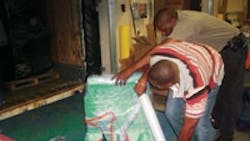Office furniture manufacturer Haworth Inc. and trucking company Perkins Logistics have implemented a new packing procedure, using protective blankets rather than cardboard containers, which allows Haworth to ship 65% more products into Perkins' trailers, reducing the number of loads needed and eliminating cardboard waste. In years past this achievement would have been touted as a best practice in logistics, but in this environmentally-conscious era, the companies are instead emphasizing that the ability to fit more products into the same amount of trailer space could result in a 20% reduction in carbon dioxide emissions by virtue of having fewer trucks on the road.
According to an independent study conducted by research firm Allegiant Global Services, the elimination of those unneeded trucks over a year's time would reduce carbon dioxide emissions by more than 283 metric tons, or the equivalent of removing 52 passenger cars from the road for a year.
The packaging method relies on reusable blankets, straps, bars and plywood tiers rather than cardboard boxes and other packing materials.
A Haworth official said he was pleased with the results from the two-month test, and the company is assessing its more widespread use.
"Packaging methods play a significant role in shipping efficiencies, but only after conducting a thorough investigation did we determine that a few fundamental changes in this area could also help reduce one element of the total carbon footprint of our products, taken over their useful lives," says Henry Oosterhouse, Haworth's global transportation manager."While it took some added effort on our end, our customers said they appreciated avoiding the labor of unpacking boxes and disposing of cardboard waste."
The new packing method actually adds roughly 15% to the cost of a shipment due to the need for additional labor and reusable equipment, notes Gregory Maiers, chief operating officer of Perkins Logistics. However, those costs are offset by the increase in the number of items shipped per load, as well as savings from the elimination of cardboard boxes and the labor used to containerize products.
The blanket-packing method has already caught on at least one Haworth customer's facility. Bradley Cupit, assistant warehouse manager of Alabama Business Furnishings, a certified dealer of Haworth products, insists that all products shipped to his facility from Haworth be protected with the blankets rather than cardboard containers, as the new method saves his staff hours of unloading goods and disposing of packing waste.
"We [recently] unloaded a shipment of 158 office chairs that were blanket wrapped in about 45 minutes," Cupit says. "Normally that would have taken a minimum of two hours for products that were boxed in cardboard. When you take into account all of the time we would have spent on unboxing and installing the chairs and getting rid of the cardboard, we probably saved about half a day of work."
See Also
About the Author
Dave Blanchard
Senior Director of Content
Focus: Supply Chain
Call: (941) 208-4370
Follow on Twitter @SupplyChainDave
During his career Dave Blanchard has led the editorial management of many of Endeavor Business Media's best-known brands, including IndustryWeek, EHS Today, Material Handling & Logistics, Logistics Today, Supply Chain Technology News, and Business Finance. He also serves as senior content director of the annual Safety Leadership Conference. With over 30 years of B2B media experience, Dave literally wrote the book on supply chain management, Supply Chain Management Best Practices (John Wiley & Sons, 2010), which has been translated into several languages and is currently in its second edition. He is a frequent speaker and moderator at major trade shows and conferences, and has won numerous awards for writing and editing. He is a voting member of the jury of the Logistics Hall of Fame, and is a graduate of Northern Illinois University.
